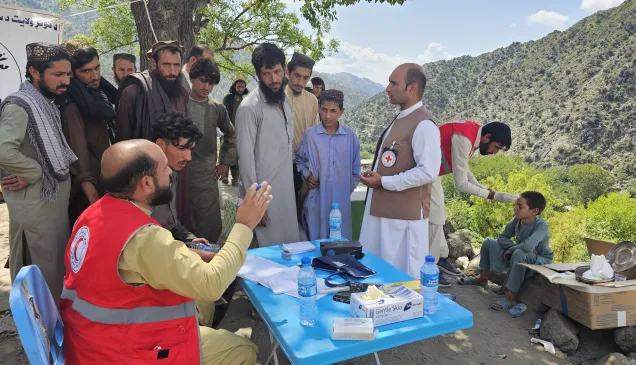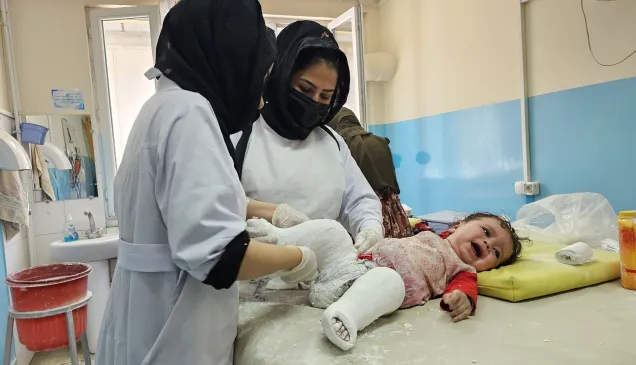Afghanistan: Empowering farming communities for sustained rural livelihood
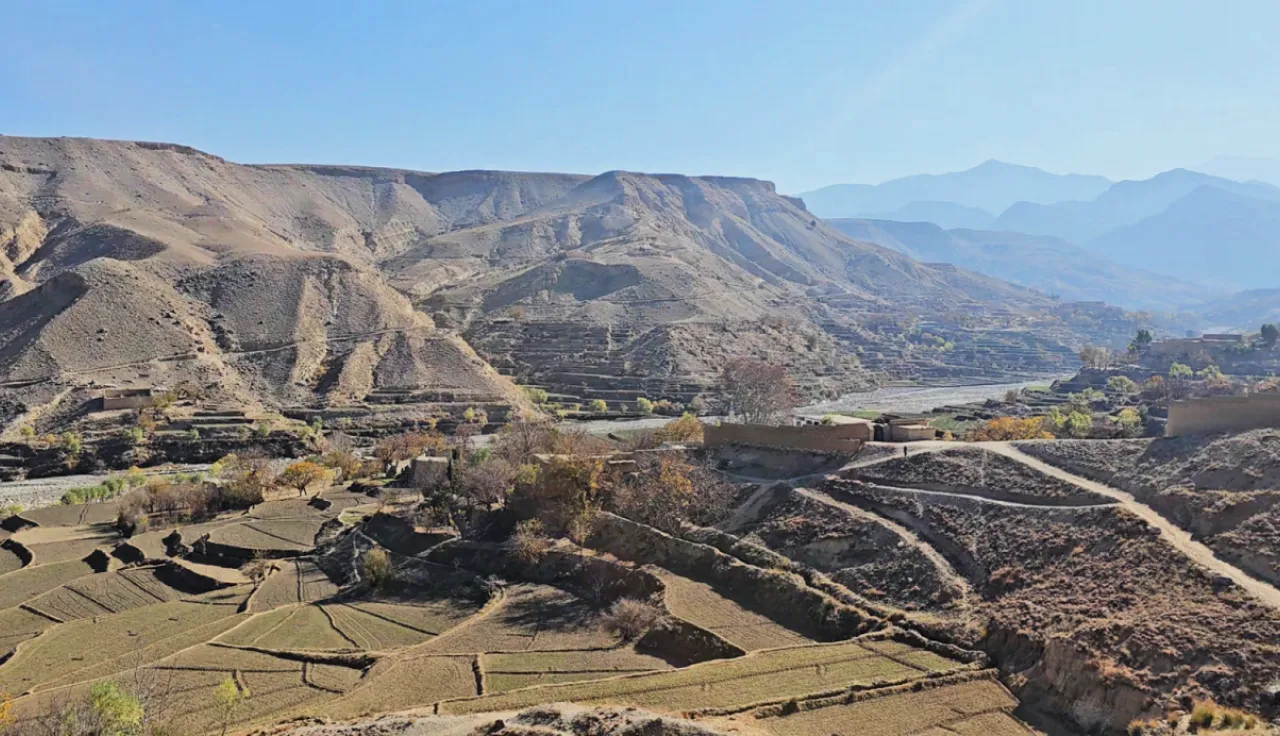
Afghanistan has endured four decades of armed conflict and is particularly vulnerable to natural disasters and the negative effects of climate change. This has created massive economic challenges and severely impacted the country’s agricultural sector, which remains the primary means of livelihood for nearly 80 per cent of Afghans.
Agricultural livelihoods have been one of the biggest casualties of extreme climate events, such as droughts, unseasonal rainfall and floods, leading to crop failures, reduced yield and worsening food insecurity for over 14 million people according to a 2025 prediction of the Integrated Food Security Classification. The International Committee of the Red Cross (ICRC) has been helping Afghan farmers recover by implementing several targeted initiatives.
Farmers and communities reliant on agriculture are confronted with a dire situation, with challenges threatening to exacerbate the already precarious food insecurity in the country,
said Katharina Ritz, head of the ICRC’s delegation in Kabul.
“Each farmer grapples with significant hardships and these struggles can reverberate throughout entire communities, leading to dramatic consequences. Agricultural viability and community well-being are closely interconnected, and this underscores the urgency of addressing these issues to prevent further deterioration of the food security crisis,” she added.
Financial support to farmers amid agricultural challenges
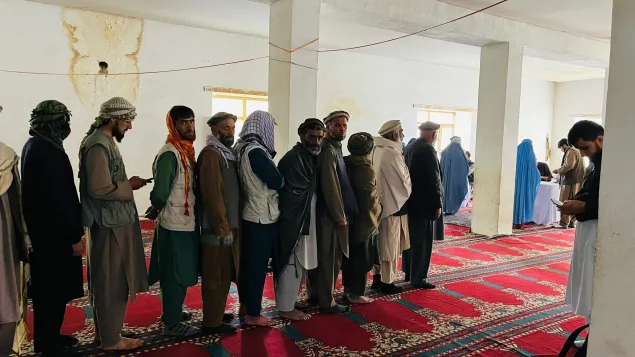
To help farmers overcome agriculture-related hardships, 1,229 households in the Paryan and Shutul districts of Panjshir Province received cash grants for land preparation, agricultural inputs and fodder.
In 2024, the ICRC provided cash grants to over 50,000 Afghan farmers to buy essential supplies such as seed, fertilizers and tools to improve productivity. In Shutul district, around 700 farmers benefited from this initiative.
Our family was struggling financially before receiving this support. The cash grant has changed many lives in my village,
shared Aziz Agha, a 27-year-old farmer and the primary provider for his family of six in Shutul.
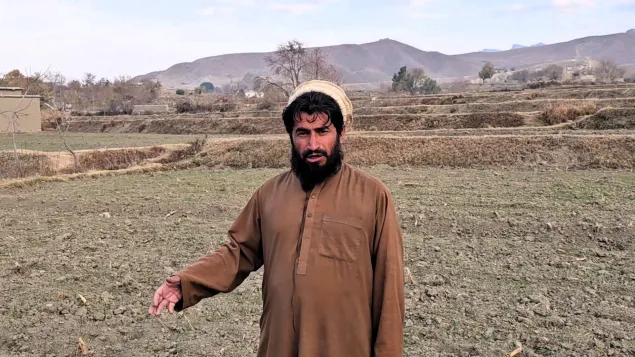
Habibullah is one of 1,094 farmers from Dehbala district of Nangarhar Province who received ICRC’s financial assistance.
Habibullah, who lives in Dehbala district of Nangarhar Province with his family of 14, explained,
"My family and I depend on the produce of this land and our income is around 60 AFN on average a day. The farmlands in our village have been damaged by the years of war and now the land doesn't yield as much as it used to before. With the ICRC’s help, I bought seed and fixed the land which was cratered everywhere because of many bombs."
Years of conflict have severely impacted Dehbala, disrupting farming activities and limiting access to essential agricultural resources. With additional economic hardships such lack of employment opportunities and difficult access to markets, many farmers struggled to prepare their land for cultivation. Following the support from the ICRC, these communities now have the resources needed to restore their farms, strengthening food security and livelihoods.
Repairing irrigation systems to improve water access for communities
Decades of armed conflict have also left many irrigation canals damaged, which severely reduced farmers' ability to sustain their crops. To address this challenge, the ICRC works closely with local communities to restore vital water sources and ensure reliable irrigation for agricultural lands.
In 2024, over 27,000 workers were hired through 16 community-based initiatives to repair irrigation systems, construct flood protection walls and clean canals across 11 provinces, providing them with short-term employment opportunities and benefiting thousands of people through improved water supply.
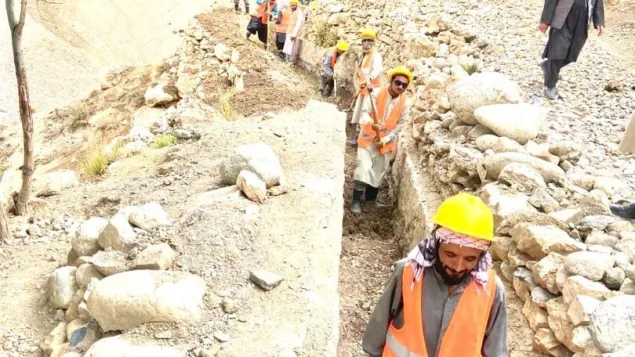
More than 240 community workers participated in cleaning an irrigation canal, benefiting 710 households in Surkhshal village, Paryan district of Panjshir Province.
We were facing financial difficulties, especially during our harsh winters. The ICRC’s project not only provided us with an income but also restored an essential water source for our farmlands. Previously, water was wasted because of poor management. Now, with the canal functioning properly, I am confident our wheat and potato harvests will bring us good income this year,
shared Haji Shah Wali, a resident of Surkhshal village.
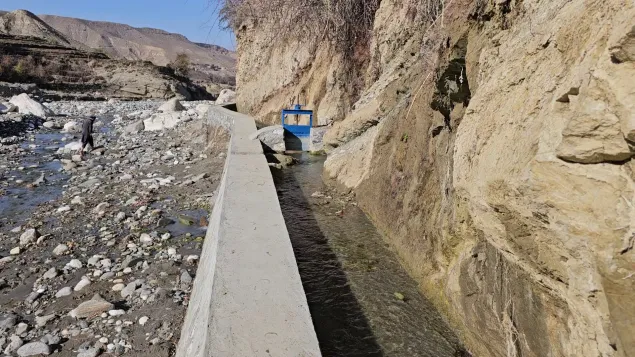
An irrigation canal was repaired and upgraded for the Gerikhil community in Nangarhar Province. The community used to struggle with seasonal floods, economic instability and food shortages, which was worsened by the effects of decades of armed conflict.
To support the community in Gerikhil, the ICRC partnered with the Afghan Red Crescent Society (ARCS) to launch a canal cleaning project. This initiative provided income to 175 community members and benefited 1,400 farmers by improving irrigation access.
The canal restoration will also bring wider economic benefits, supporting neighbouring villages and the main market centre of Pachiragam district. With improved water management, farmers will be able to cultivate their land more efficiently, have increased yield and expand their ability to sell produce locally and beyond.
Promoting sustainable farming
To support sustainable farming practices and reduce post-harvest losses, the ICRC organized specialized training sessions for farmers that focused on best practices in post-harvest management, helping farmers minimize grain losses and improve storage efficiency. In 2024, 200 farmers from Kapisa Province were selected and trained in post-harvest loss management and provided with metal silos for grain storage. Additionally, 80 farmers in Paryan district of Panjshir Province were trained to promote good agronomic practices and raise awareness about climate and environmental risks, enabling them to share their knowledge with fellow farmers.
Among the participants was 48-year-old Abdul Mobin from Kohistan Hesa Awal district, Kapisa Province, who said, “I lacked knowledge of several important farming techniques, especially regarding post-harvest loss management. However, the ICRC’s five-day training helped me gain valuable insights which I can confidently apply on my farm.”
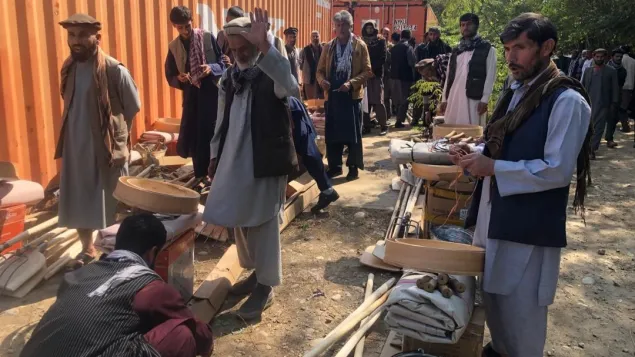
Farmers from Kohistan Hesa Awal and Hesa Do districts of Kapisa Province receiving agricultural tools.
Abdul Mobin also received two metal silos and agricultural tools to improve his farming efficiency. “These silos have been useful to store my harvest, and the tools have made my work easier both during and after harvesting. Before this project, my post-harvest losses were over 40 per cent, but now they have been reduced to zero,” he added.
Janeth Idolog, who leads the ICRC’s economic security programmes in Afghanistan, said, “Empowering farmers with the right knowledge, tools and resources is key to building resilient communities. We are not only improving agricultural productivity but also restoring critical irrigation systems and securing livelihoods for thousands of families. By working alongside local communities and our partners from the Afghan Red Crescent Society, we continue to empower communities in Afghanistan to build resilience, increase agricultural productivity, and adopt sustainable farming methods for a more food-secure future.”

